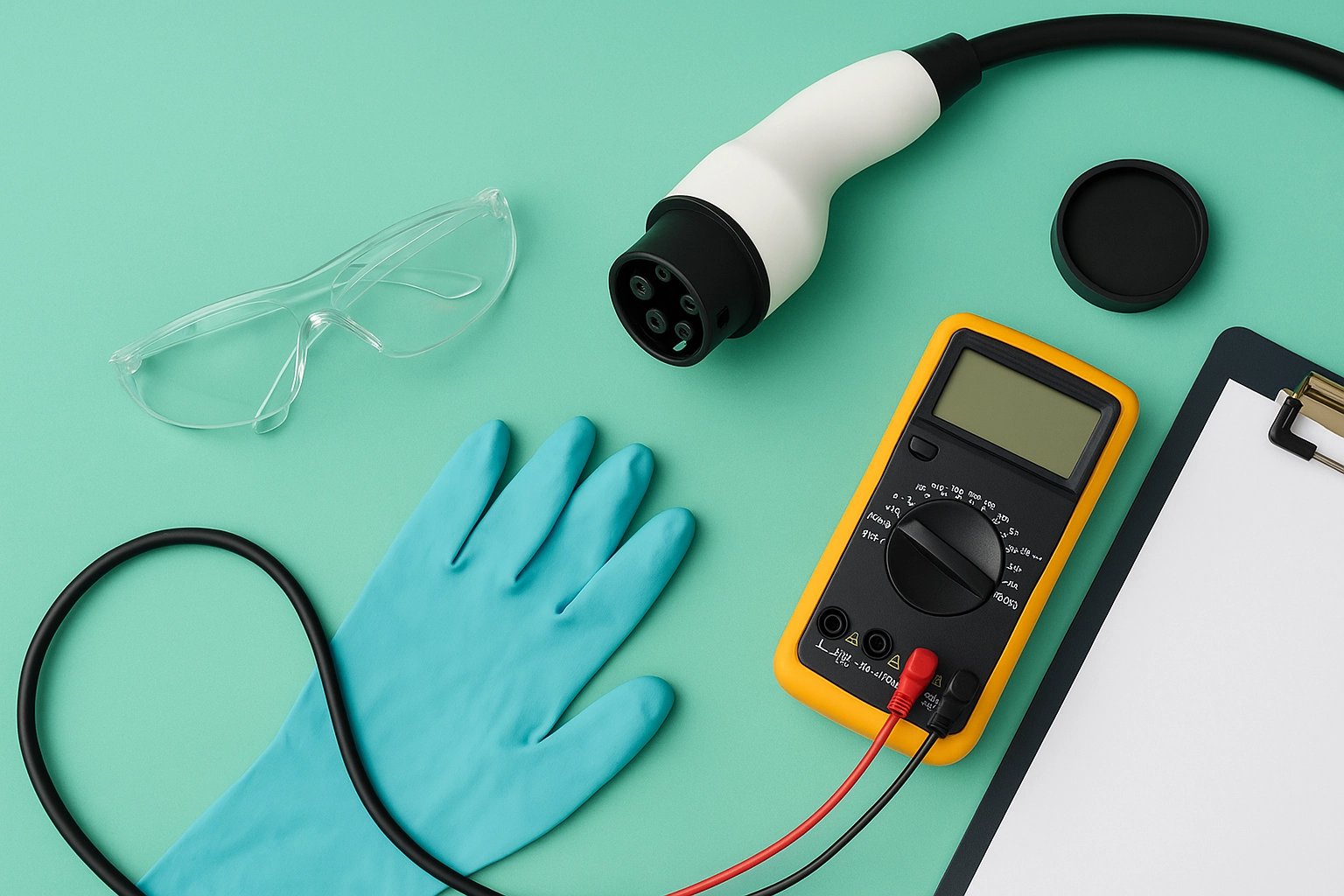EN 62196-2 Type 3 Charging Connector Test
The EN 62196-2 standard for Type 3 charging connectors is a critical part of ensuring the safety, performance, and interoperability of electric vehicle (EV) charging systems. This test focuses on verifying that the connector complies with all relevant standards to ensure it functions correctly under various conditions. Compliance with this standard ensures compatibility between different EVs and charging stations, enhancing user experience while reducing potential hazards.
The Type 3 connector is designed for high-power DC charging applications, typically used in rapid charging scenarios where power transfer rates can reach up to 100 kW or more. The test covers a range of parameters including mechanical strength, electrical performance, and environmental resistance. These tests are essential for manufacturers to ensure their products meet the stringent requirements set by international standards.
The EN 62196-2 Type 3 connector test involves several key components:
- Electrical Integrity: Ensuring that the electrical connections are secure and reliable under high voltage conditions.
- Mechanical Durability: Testing the connectors' ability to withstand repeated cycles of connection, disconnection, and environmental stresses like temperature changes.
- Environmental Resistance: Evaluating the connector's performance in various environmental conditions such as humidity, dust, and extreme temperatures.
The testing process is rigorous and involves multiple stages:
- Visual Inspection: Initial examination for any visible damage or defects.
- Electrical Test: Measurement of resistance, insulation resistance, and continuity checks.
- Mechanical Stress Test: Simulating real-world conditions to evaluate the connector's durability.
- Environmental Testing: Exposure to various environmental factors to ensure long-term reliability.
The results from these tests are documented meticulously. Reports include detailed information about any issues found during testing, along with recommendations for improvement if necessary. This comprehensive approach ensures that only high-quality connectors reach the market, contributing significantly to public safety and the overall EV charging infrastructure.
| Test Parameter | Description |
|---|---|
| Electrical Integrity | Verification of secure electrical connections under high voltage conditions. |
| Mechanical Durability | Evaluation of the connector's ability to withstand repeated cycles and environmental stresses. |
| Environmental Resistance | Assessment of performance in various environmental conditions like humidity, dust, and temperature extremes. |
In conclusion, the EN 62196-2 Type 3 charging connector test is vital for ensuring that EV chargers meet international standards. This process not only enhances user safety but also promotes interoperability between different vehicle models and brands.
Industry Applications
The EN 62196-2 Type 3 charging connector test is widely used across the automotive industry, particularly in sectors focusing on electric vehicles. This standard ensures that the connectors are reliable and safe for use in high-power DC charging applications.
- Manufacturers: Ensure compliance with international standards to market their products globally.
- R&D Engineers: Develop new technologies by adhering to stringent testing protocols.
- Quality Managers: Monitor production processes and quality control to maintain high standards of safety and performance.
- Compliance Officers: Ensure regulatory compliance, especially in regions with strict environmental regulations.
The test is particularly important for manufacturers looking to penetrate the growing EV market. By ensuring their products meet these stringent requirements, companies can enhance customer trust and satisfaction while also contributing to the broader sustainability goals of reducing carbon emissions.
Environmental and Sustainability Contributions
The EN 62196-2 Type 3 charging connector test plays a crucial role in promoting environmental sustainability. By ensuring that EV chargers are safe, reliable, and interoperable, this standard helps reduce the need for frequent replacements or repairs, thus extending the life cycle of these devices. This contributes to reducing electronic waste and conserving resources.
In addition, by enhancing user experience through consistent performance across different vehicles and charging stations, this test supports the broader goal of increasing EV adoption. As more people switch to electric vehicles, the demand for reliable infrastructure grows, making such tests even more critical.
The results of these tests also inform future developments in EV technology. By identifying potential weaknesses or areas for improvement early on, manufacturers can innovate and improve their products, leading to more efficient and sustainable transportation solutions.
Use Cases and Application Examples
The EN 62196-2 Type 3 charging connector test is applicable in a variety of scenarios:
- Rapid Charging Stations: Ensuring that the connectors used at these stations can handle high power loads safely.
- Public Transportation Fleets: Requiring robust connectors to support frequent use and maintenance-free operation over long periods.
- Private Charging Solutions: Providing peace of mind for homeowners who install their own charging units.
- Rental Car Services: Ensuring that all vehicles are equipped with reliable chargers for a seamless user experience.
| Use Case | Description |
|---|---|
| Rapid Charging Stations | Supporting high-power charging needs in urban areas and highways. |
| Public Transportation Fleets | Maintaining reliability for frequent use by multiple vehicles. |
| Private Charging Solutions | Easing the concerns of homeowners about their personal charging units' safety. |
| Rental Car Services | Avoiding disruptions due to faulty chargers, enhancing user experience. |





